Abstract
Exposure to adverse events in childhood is a predictor of subsequent exposure to adverse events in adulthood, and both are predictors of depression in adults. The degree to which adult depression has a direct effect of childhood adversity versus an indirect effect mediated by adult adversity has not previously been reported. We report data collected from 210 adult participants regarding childhood and adult adversity and current symptoms of depression. Mediation of the relationship between childhood adversity and adult depression by adult adversity was statistically assessed to evaluate the relative direct and indirect effects of childhood adversity on current depression levels in adults. Both the direct effect of childhood adversity on adult depression and the indirect effect, mediated by adulthood events, were significant. Therefore, partial mediation of the relationship between childhood adversity and adult symptoms of depression by adult adverse events was found in the sample. Implications for treatment are presented.

Similar content being viewed by others
References
Baron, R. M., & Kenny, D. A. (1986). The moderator-mediator variable distinction in social psychological research: Conceptual, strategic and statistical considerations. Journal of Personality and Social Psychology, 51, 1173–1182.
Chapman, D. P., Whitfield, C. L., Felitti, V. J., Dube, S. R., Edwards, V. J., & Anda, R. F. (2004). Adverse childhood experiences and the risk of depressive disorders in adulthood. Journal of Affective Disorders, 82, 217–225.
Desai, S., Arias, I., Thomspn, M. P., & Basile, K. C. (2002). Childhood victimization and subsequent adult revictimization assessed in a nationally representative sample of women and men. Violence and Victimization, 17(6), 639–653.
Dong, M., Anda, R. F., Felitti, V. J., Dube, S. R., Williamson, D. F., Thompson, T. J., et al. (2004). The interrelatedness of multiple forms of childhood abuse, neglect, and household dysfunction. Child Abuse and Neglect, 28(7), 771–784.
Dube, S. R., Felitti, V. J., Dong, M., Giles, W. H., & Anda, R. F. (2003). The impact of adverse childhood experiences on health problems: Evidence from four birth cohorts dating back to 1900. Preventive Medicine, 37, 268–277.
Felitti, V. J., Anda, R. F., Nordenberg, D., Williamson, D. F., Spitz, A. M., Edwards, V., et al. (1998). The relationship of childhood abuse and household dysfunction to many of the leading causes of death in adults. Preventive Medicine, 14(4), 245–258.
Hammen, C., Henry, R., & Daley, S. E. (2000). Depression and sensitization to stressors among young women as a function of childhood adversity. Journal of Consulting and Clinical Psychology, 68(5), 782–797.
Harkness, K. L., & Monroe, S. M. (2002). Childhood adversity and the endogenous versus nonendogenous distinction in women with major depression. American Journal of Psychiatry, 159, 387–393.
Hazel, N. A., Hammen, C., Brennan, P. A., & Najman, J. (2008). Early childhood adversity and adolescent depression: the mediating role of continued stress. Psychological Medicine, 38, 581–589.
Holmes, T. H., & Rahe, R. H. (1967). The social readjustment rating scale. Journal of Psychosomatic Research, 11(2), 213–218.
Kendler, K. S., Karkowski, L. M., & Prescott, C. A. (1999). Causal relationship between stressful life events and the onset of major depression. American Journal of Psychiatry, 156, 837–841.
Kessler, R. C. (1997). The effects of stressful life events on depression. Annual Review of Psychology, 48, 191–214.
MacKinnon, D. P., & Dwyer, J. H. (1993). Estimating mediated effects in prevention studies. Evaluation Review, 17(2), 144–158.
Martin, A., Rief, W., Klaiberg, A., & Braehler, E. (2006). Validity of the Brief Patient Health Questionnaire Mood Scale (PHQ-9) in the general population. General Hospital Psychiatry, 28(1), 71–77.
McLaughlin, K. A., Conron, K. J., Koenen, K. C., & Gilman, S. E. (2009). Childhood adversity, adult stressful life events, and risk of past-year psychiatric disorder: A test of the stress sensitization hypothesis in a population-based sample of adults. Psychological Medicine. doi:10.1017/S0033291709992121. Retrieved February 2010.
Nemeroff, C. B., Heim, C. M., Thase, M. E., Klein, D. N., Rush, J. A., et al. (2003). Differential responses to psychotherapy versus pharmacology in patients with chronic forms of major depression and childhood trauma. Proceedings of the National Academy of Sciences, 100(24), 14293–14296.
O’Donnell, M. L., Creamer, M., & Pattison, P. (2004). Posttraumatic stress disorder and depression following trauma; understanding comorbidity. American Journal of Psychiatry, 161, 1390–1396.
Penza, K. M., Heim, C., & Nemeroff, C. B. (2003). Neurobiological effects of childhood abuse: Implications for the pathophysiology of depression and anxiety. Archives of Women’s’ Mental Health, 6, 15–22.
Riso, L. P., Miyatake, R. K., & Thase, M. E. (2002). The search for determinants of chronic depression: A review of six factors. Journal of Affective Disorders, 70, 103–115.
Spitzer, R. L., Kroenke, K., & Williams, J. B. (1999). Validation and utility of a self-report version of the PRIME-MD: the PHQ primary care study. Primary care evaluation of mental disorder. Patient Health Questionnaire. Journal of the American Medical Association, 282(18), 1737–1744.
Turner, H. A., & Butler, M. J. (2003). Direct and indirect effects of childhood adversity on depressive symptoms in young adults. Journal of Youth and Adolescence, 32(2), 89–103.
Whiffen, V. E., & MacIntosh, H. B. (2005). Mediators of the link between childhood sexual abuse and emotional distress. A critical review. Trauma Violence and Abuse, 6(1), 24–39.
Widom, C. S., Czaja, S. J., & Dutton, M. A. (2008). Childhood victimization and lifetime revictimization. Child Abuse and Neglect, 32, 785–796.
Wiersma, J. E., Hovens, J. G. F. M., van Oppen, P., Giltay, E. J., van Schaik, D. J. F., Beekman, T. F. A., et al. (2009). The importance of childhood trauma and childhood life events for chronicity of depression in adults. Journal of Clinical Psychiatry, 70(7), 983–989.
Author information
Authors and Affiliations
Corresponding author
Rights and permissions
About this article
Cite this article
LaNoue, M., Graeber, D., de Hernandez, B.U. et al. Direct and Indirect Effects of Childhood Adversity on Adult Depression. Community Ment Health J 48, 187–192 (2012). https://doi.org/10.1007/s10597-010-9369-2
Received:
Accepted:
Published:
Issue Date:
DOI: https://doi.org/10.1007/s10597-010-9369-2




